Getting your first turkey, whether a chick or an adult bird, is a super fun experience. You might think they are like a chicken but bigger. I’m here to tell you that they are so much fun. In fact, I think they are much more personable than most chickens. Turkeys require more protein in their diet than chickens. What do turkeys eat? I’m going to explore that question in some detail.
Feel free to use the table of contents to skip around, or read through from start to finish. It’s up to you!
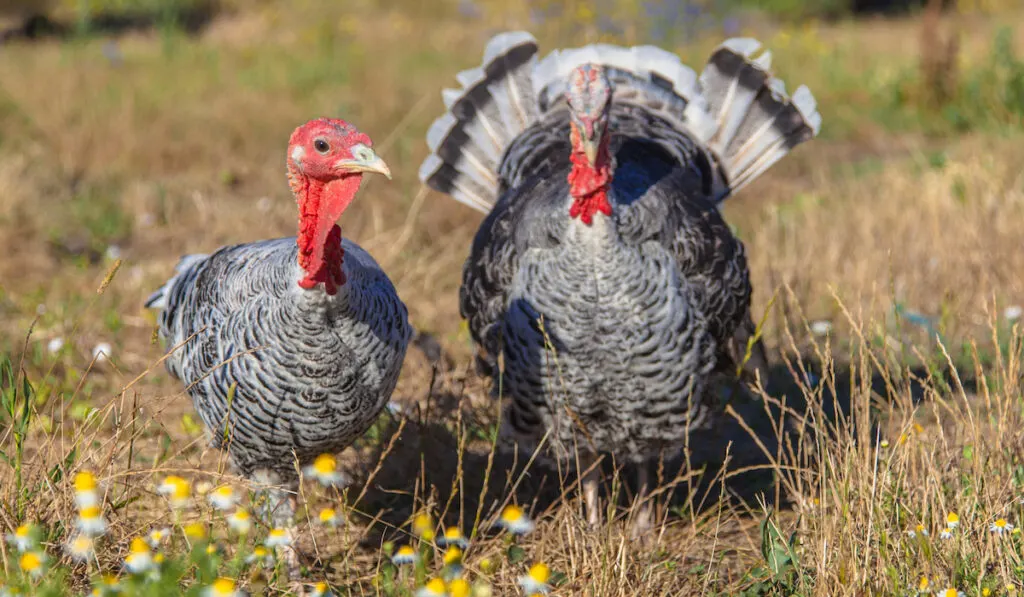
Table of Contents
Nutrition Requirements
When looking at nutrition requirements across the board for turkeys, one thing you may encounter is many different theories on how much protein birds should receive at each stage of growth.
In fact, some feeding recommendations break down feeding recommendations for turkeys into increments that are impossible for the backyard turkey owner to follow.
The truth of the matter is, if you are not raising turkeys commercially, this level of detail isn’t necessary. These three nutritional recommendations are both reasonable and feasible for backyard poultry farmers like you and I.
| Stage | Age | Protein Level |
| Chicks | 1 – 4 Weeks | 28% |
| Young Birds | 5-12 Weeks | 20 – 24% |
| Adult Birds | 13 Weeks and Older | 14 – 16% |
Chicks
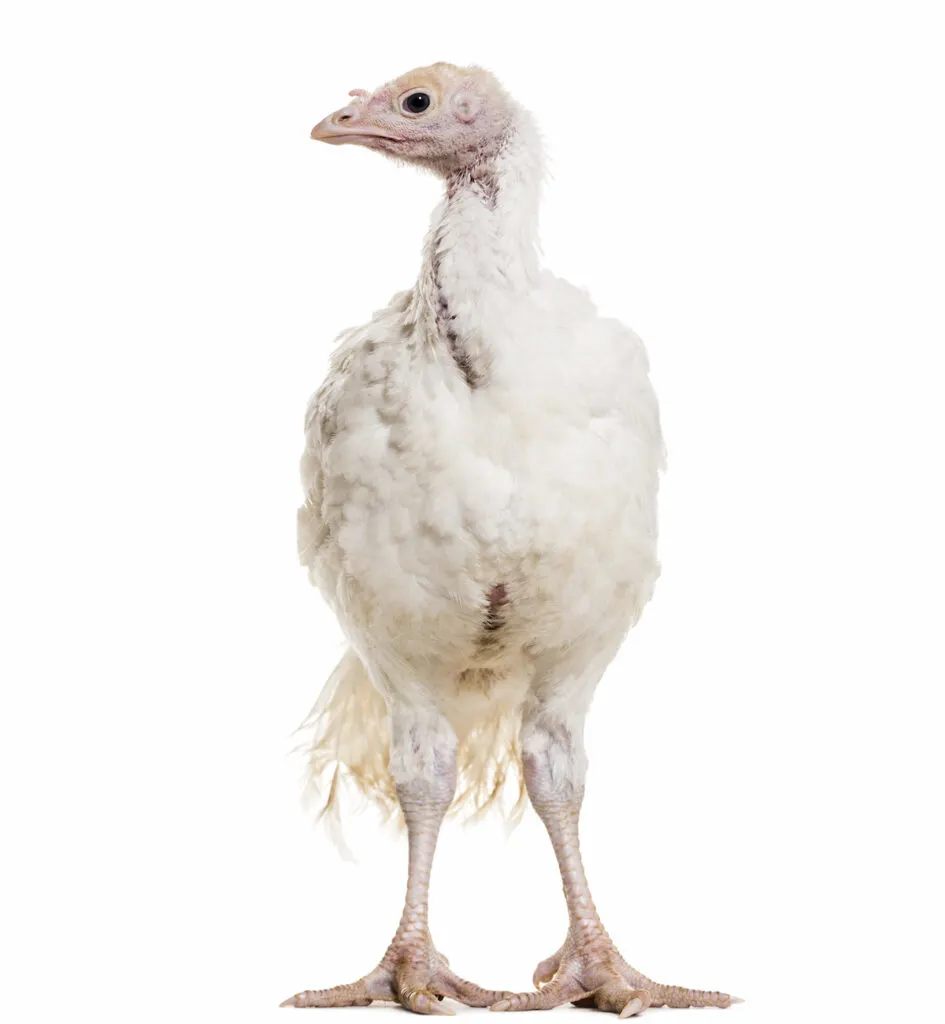
When it comes to feeding chicks, not all chick starters are the same. Turkey chicks require a higher protein percentage than baby chickens do.
Keep in mind when choosing a feed for your baby turkey’s that there can be a 10% or more difference in the amount of protein between a chicken starter and a turkey starter.
Chick Starter Protein Percentage
| Feed Type | Protein Percentage |
| Chick Starter (Chicken) | 18 – 19% |
| Turkey Starter | 26 – 30% |
| Gamebird Starter | 28 – 30% |
When a turkey chick initially hatches, it absorbs the yolk into its abdomen. The yolk can provide all the nutrition the chick needs for a day or two but then, turkey chicks should be offered a properly formulated starter feed.
Depending on the area you live, you may be able to purchase “turkey starter”. If you can’t find a specific turkey starter product at your local feed store, ask for a “game bird” starter.
Turkey starters and game bird starters will both have a higher percentage of protein than chick starter. Because turkeys grow to be much larger birds than chicks, this is important to ensure adequate growth.
Raising Chicken and Turkey Chicks Together
If you are brooding chicken chicks and turkey chicks together you should always go with the higher protein feed if possible.
Chick starter typically has a protein percentage of 22 to 24%. This percentage protein is fine for chickens but may cause your turkey chicks to grow slower than they would if they were on an appropriate feed.
Feeding your baby chickens a higher protein turkey feed for the first few weeks should have no long term effects. When at all possible, though, it is best to brood them separately and feed them species-appropriate food.
Young Birds
As your turkey chick (poult) gets a little older, the protein requirements decrease.
At around 5 weeks of age you can start feeding a lower protein feed. Typically, this type of feed is found in feed stores called a “grower” feed.
Traditional chick starter (the kind sold for chickens) also has this protein level if you are unable to find a turkey or game bird specific product at your feed store.
Keep in mind that the transition time doesn’t have to be exact. If at 5 weeks old you still have half a bag of high protein turkey starter, just feed it till it is gone and switch when you buy a new bag.
Adults
At about 13 weeks or so, your turkeys can start eating a regular turkey or game bird feed. At this stage, you can start feeding a lower percentage protein.
As far as commercial poultry feeds go, typically the lower the total percentage protein in the feed, the less expensive it is. So, if your bird doesn’t need the extra protein, you can save some money by feeding a lower protein feed.
For adult turkeys, you can use a 16 – 20% protein feed. Most feed companies are, once again, going to brand this as a game bird feed.
Gamebird and Turkey are pretty much interchangeable when it comes to commercially available feeds.
This food will be the staple of your turkey’s diet for the rest of it’s life. That being said, it isn’t the only thing your turkey can eat. Let’s take a look at some of the foods turkeys can eat.
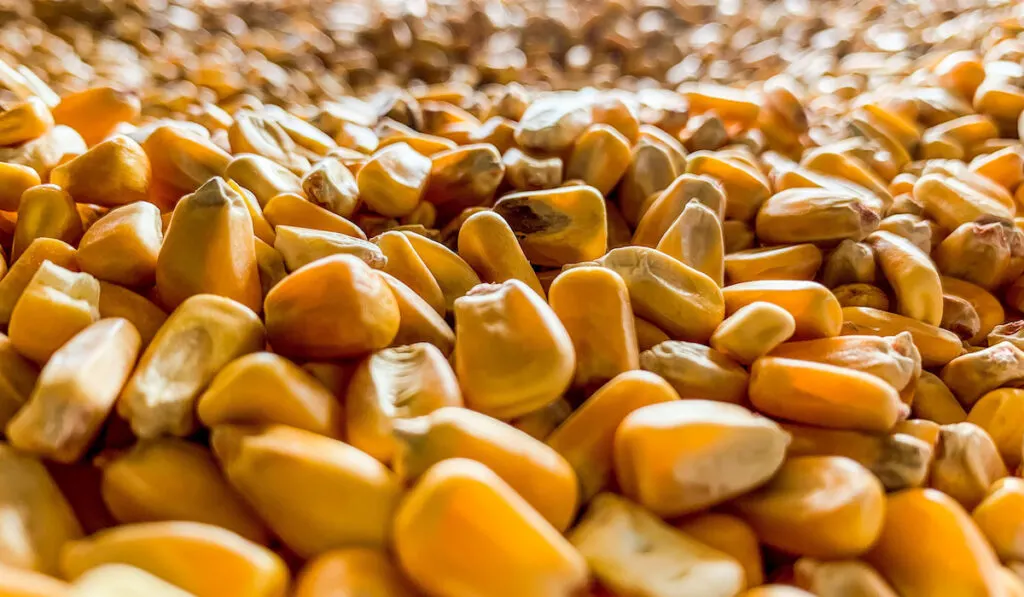
Foods Turkeys Can Eat
When it comes to feeding turkeys or any other backyard fowl, you have a lot more options for food sources than you might think. Of course, the obvious option for most chickens and turkeys is to use a pre-formulated feed. Other options include an all-natural / home-made diet and “grazing” your turkey’s on pasture.
The types of foods turkeys can eat are varied and, you can mix and match depending on your particular situation. Here are some of the more common food types for turkeys.
Pre-Formulated
Commercial feeds have been pre-formulated for your birds based on the expertise and experience of poultry nutritionists and veterinarians around the globe.
Typically, these are the most complete, nutritious feeds available. Feeding a pre-formulated turkey feed ensures your bird is getting the protein, vitamins, and minerals it needs to grow properly and live a healthy life.
Because turkeys (and chickens) are commercial birds, turkey growers and universities have put millions of dollars into research to ensure that they grow strong and healthy.
For meat birds, rations are typically formulated so they grow to their maximum potential but not so fast as to cause issues with their health.
Most feed stores will carry a properly formulated turkey feed for your birds. Just be sure to use the information above to get the right type based on your bird’s age.
Chicken Feed
If you are wondering can your turkey live off of the same chicken feed you give to your hens? The answer is an easy yes. Your turkey can live off of chicken feed but, it isn’t the best option for him nutritionally.
It’s kind of like feeding cat food to your dog. Much like dogs and cats, turkeys and chickens require differing nutritional makeups for their food.
As a whole, this mostly translates to the turkey needing more protein, though there are vitamin and mineral differences between the two species as well.
Whenever possible, you should feed your turkey specialized feed that is specifically formulated to meet his nutritional needs.
All Natural Diet
In the wild turkeys eat insects, fruits, berries, nuts, seeds, plants, and small vertebrate animals. Acorns are a particular favorite during the wintertime when other food sources are scarce.
Wild turkeys will use their feet, like chickens do, to scratch up worms, snails, and seeds to the surface. In fact, they will often spend most of their day doing this.
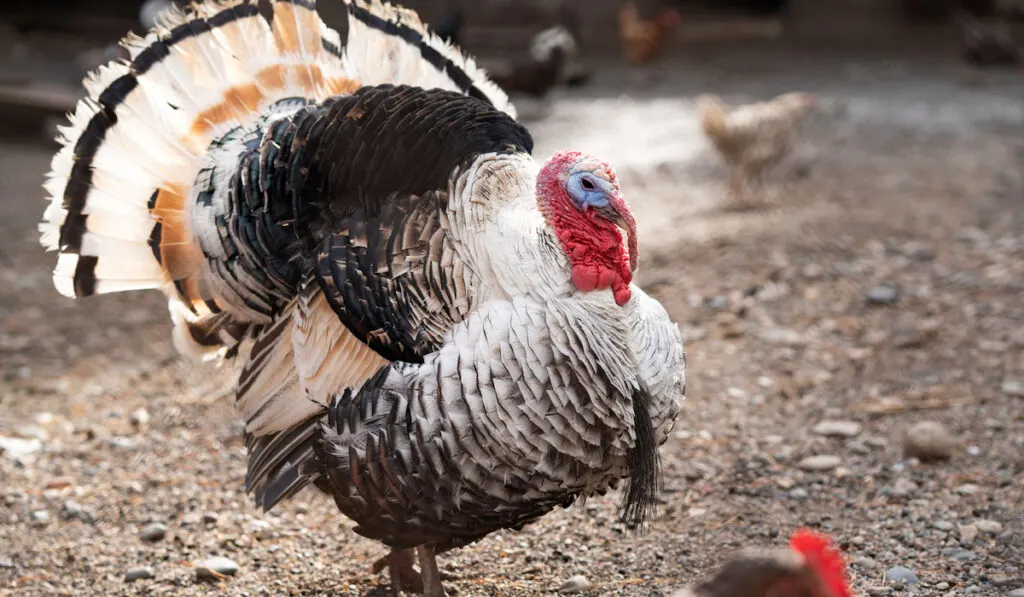
If you are raising turkeys in your backyard, it would be difficult to provide complete nutrition on household items alone. That being said, you can definitely supplement with some common foodstuffs.
Try sprinkling vegetable scraps around the yard, or toss a handful of mealworms into the dirt in order to encourage your turkey to “forage” on even a small farm.
Additionally, even if your grass is low, think about turning your turkeys out into your grassy fields to allow them to wander around searching for food.
Even if you provide formulated feed once or twice a day, your turkeys will still love being able to hunt for their own food. Here are some foods turkeys enjoy eating:
Grains
- Barley
- Black Oil Sunflower Seeds
- Bulgar
- Corn
- Flax
- Grits (cooked)
- Millet
- Milo
- Niger
- Oats (including cooked oatmeal)
- Pasta, cooked
- Rice, cooked
- Wheat
Fruits
Turkeys can eat a variety of fruits including:
- Apples
- Bananas (without the peel)
- Blueberries
- Cantaloupe (seeds and flesh)
- Cherries
- Crabapples
- Grapes
- Honeydew (seeds and flesh)
- Peaches
- Pears
- Pomegranates
- Raisins
- Raspberries
- Strawberries
- Watermelon (seeds and flesh)
Vegetables
- Asparagus
- Beans, cooked
- Beets (the vegetable and the greens)
- Bell Peppers
- Broccoli
- Brussels Sprouts
- Cabbage
- Carrots (raw or cooked, also carrot tops)
- Cauliflower
- Corn (on the cob or canned, raw or cooked)
- Cucumbers
- Eggplant
- Kale
- Lettuce
- Peas (peas, vines and flowers)
- Popcorn, no butter or salt
- Potatoes, cooked only – no green peels
- Pumpkin, raw or cooked, seeds and flesh
- Summer Squash
- Sweet Potatoes / Yams – cooked, no green peels
- Tomatoes, raw or cooked, in small amounts
- Turnips, cooked
- Zucchini
Nuts
- Acorns
- Almonds
- Beechnuts
- Brazil Nuts
- Hickory Nuts
- Macadamia Nuts
- Peanuts, commercial food grade only. Not garden peanuts.
- Pecans
- Pine Nuts
- Walnuts
Note: Commercially purchased nuts should be rinsed in water to remove salt.
Dairy
- Cheese
- Yogurt, plain or flavored
Insects & Other Items
- Mealworms
- Cicadas
Treats
Fruits, nuts, and berries, from the safe list above, make excellent treats for turkeys.
Keep in mind that turkeys naturally eat a diet that is higher in protein, not sugar. As such, items that are very sugary, such as most fruits, should be fed in moderation as a treat and not as a staple of their diet.
You can do all sorts of things to make treats more fun for your turkey to eat as well as provide enrichment in their environment, especially for birds confined to a smaller area.
Here are some ways you can help your turkey explore his environment by feeding treats:
Hang fruits or vegetables.
This is especially easy with fruits and vegetables that have a stem of some sort. You can tie a string around a stalk of broccoli, for example, and hang it for the turkeys to pick at.
Load a Net with Treats.
Visit your local party store and look for a decorative fish net . Load it up with fruits and veggies and hang. You can hang in the middle of a coop or just attach it to a wall or tree. Use a hook to make it easy to load and reload.
Your turkeys (and chickens) will love “foraging” from the net. Just be sure you choose a net with holes that are wide enough for them to peck at but not so wide that they can get their whole head in the net and get stuck.
A net like this is best used while your birds are supervised.
Use a Suet Cage
- Vinyl coated wire construction offers durability
- Ten feeding perches allows various birds to feed at a time
- Side-opening design allows easy filling
- Basket-style feeder can be filled with suet to attract a variety of wild birds
- 5: 2″ x 5.25″ x 5.25″
A suet cage like the one above is great for loading with fruits and vegetables for your birds to graze on throughout the day.
Just remember to clean it out if they leave any behind (not likely) and regularly add fresh fruits and veggies.
Feed Turkeys Treats by Hand
Feeding your turkey treats by hand is a great way to get your birds to become more friendly and used to you. They will learn that not only do you not hurt them, coming close to you usually means they get some kind of yummy treat!
Just be careful not to have treats in a bare hand where you might get pecked. You can also get the same effect by tossing foods on the floor right at your feet, which encourages the turkeys to get over their fears of getting close.
Foods Turkeys Should Not Eat
When it comes to turkeys, there are definitely some foods they should not eat. Generally speaking, don’t feed your turkeys anything you wouldn’t reasonably consume. Things like moldy bread and rotted food should be thrown in the trash and not given to your birds. Let’s explore foods turkeys should not eat in a little more detail.
Moldy Feed
Turkeys, like chickens, should not have moldy foods. This includes moldy bread or any other food with mold on it.
According to theHipChick.com, moldy foods have mycotoxins which can cause health problems in any bird with a crop.
In fact, Mississippi State University says that feeding moldy foods can cause birds to develop mycosis (or thrush).
Toxic Foods
The following foods are known to be toxic to turkeys. The actual amount that needs to be consumed for toxic effects to take place aren’t always the same. It is best to not actively feed any of these items to your turkeys.
If your turkeys are accidentally fed one of these foods, simply remove it from their pen and monitor them for any ill effects.
- Aubergine
- Avocado – contains persin which can be deadly to birds
- Potato Peels. Sprouts, and Leaves – The green areas of potatoes are poisonous to both humans and birds.
- Peanuts, raw – can have a fungus called aflatoxin
- Tobacco in any form including leaves, discarded cigarette butts, etc.
- Tomato leaves
- Nightshade Plants
- Rhubarb Leaves – contain oxalic acid, a poison
Common Garden Plants that Are Toxic to Turkeys
- Morning Glory Seeds
- Sweet Pea Seeds
- Datura Seeds
For more details on what turkeys should not eat, check out my post: What Not To Feed Turkeys.
Don’t Forget Water
I’ve talked about all kinds of different foods you can, and should not, feed your turkey. This article wouldn’t be complete if I didn’t mention water.
I get it, water isn’t food, but it is critical for your turkey to have access to clean, liquid water at all times.
I know you are thinking, really, you said liquid, duh water should be liquid. The fact of the matter is, in winter water freezes. It can become very easy for your turkey to become dehydrated even if there is snow on the ground, for example.
During the summer, turkeys can knock over water buckets or troughs as well. They are big birds and sometimes strutting their stuff has unintended consequences like knocking their water over.
Always take care to make sure your turkey has fresh, clean water available at all times. When possible, consider having two water sources for them to choose from.
How to Fatten Up A Turkey
While all of my turkeys were pets, not headed for the table, I know that for some turkey farmers, some birds will become food. In that case, here are some ideas to help fatten up your turkey.
Feed High Protein Feed
When finishing out turkeys for the table, you can continue to feed them a higher protein feed, much as you would a younger bird. This can come in the form of a starter or grower feed.
For fattening up a turkey, using a 30% protein gamebird feed will likely give the best results.
In addition to commercial feeds that are high in protein, you can supplement your turkey with high protein foods. Alfalfa hay, for example, is a great high protein treat your turkeys can browse on.
Feeding Extra Grains
Consider adding corn and oats to your turkey’s diet in larger quantities. Corn is especially good for weight gain but typically results in birds putting on fat and not muscle. Even so, it is good to offer different types of food to encourage the bird to eat more.
Oats have about 11 – 14% protein and are a great grain to feed as well. Giving your turkey a variety of grains to access will help encourage them to eat.
Keep Feed Located in One Spot
While I don’t like the idea of confining turkeys to help them gain weight, you can somewhat curb their desire to roam and “exercise” by feeding them in a central location.
When all of the food and water is easily accessed in one location, they will be less likely to wander around all day burning calories.
Precautions
It is important to note that, even though your turkeys are destined for the table, they should be allowed to grow and develop properly. You don’t want to keep young turkeys on too high protein while they are growing.
Birds that grow too quickly are more prone to physical issues and possibly more susceptible to internal issues like problems with their liver or other organs.
Your efforts for fattening up your turkeys should be limited to the 2 – 4 weeks prior to butchering. This is typically between 18 – 22 weeks old depending on the breed.
Frequently Asked Questions
On a farm, turkeys typically eat a specialized game bird feed provided by the farmer. In addition, they typically have access to search for bugs, lizards, and grains during the day.
In the winter wild turkeys will search for berries nuts,, plants and insects. In addition, they will feed on small vertebrates such as mice when available.
Turkeys can eat bell peppers of any color however, according to R. Scott Beyer, a Poultry Specialist at Kansas State University, feeding red peppers can cause the yolks to turn a pinkish color.

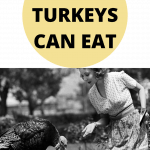
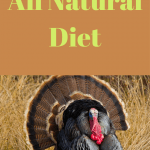
Azeez kehinde bashir
Thursday 26th of May 2022
What can I give my turkey to grow well withe 8 month
H
Monday 7th of June 2021
You have eggplant listed as a food turkeys can eat, then list aubergine as a food the can not eat. They are the same thing. It is a nightshade, as well as tomatoes, peppers, potatoes, which are all in the acceptable list.
uche
Tuesday 30th of March 2021
how can i get those feeds in my local market